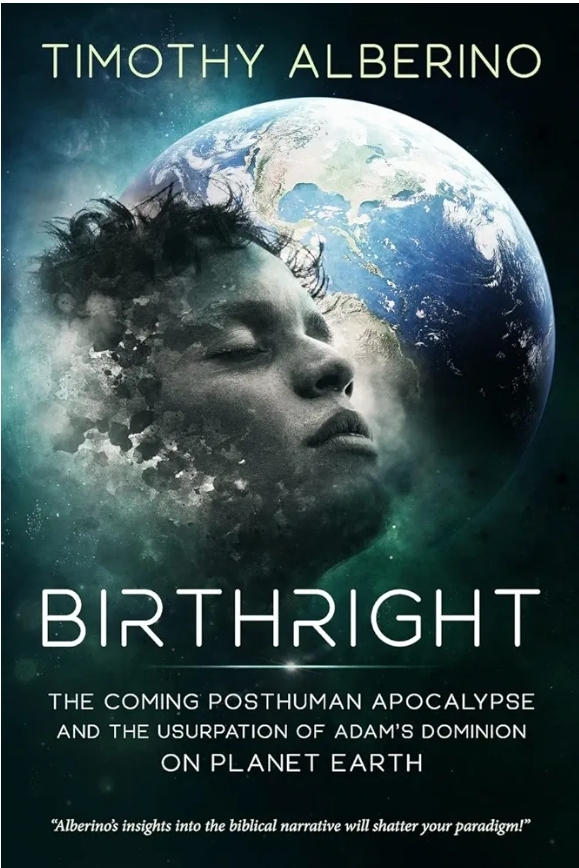Birthright by Timothy Alberino is an in-depth exploration of theological, historical, and futuristic perspectives concerning humanity’s divine inheritance, spiritual destiny, and the threats posed by technological advancements and spiritual deception. Alberino dives into biblical prophecy, ancient history, modern science, and transhumanism to address the overarching theme: The battle over humanity’s birthright and dominion over Earth as ordained by God.
Alberino challenges readers to see the world through a biblical and eschatological lens, arguing that the ongoing advancements in artificial intelligence, genetic engineering, and posthumanism are not merely scientific milestones but part of a spiritual and cosmic conflict.
Central Thesis
The central argument of Birthright is that humanity was created in the image of God, with a divine mandate to rule over Earth (Genesis 1:26-28). However, this birthright has been under attack since the beginning, first through the Fall in Eden and now through modern technologies and ideologies aimed at reshaping human nature and identity.
Alberino warns of a coming posthuman apocalypse, where humanity risks losing its divine inheritance by embracing transhumanism and artificial intelligence, which he describes as tools of spiritual rebellion and deception.
Key Themes and Concepts
The Birthright of Humanity
- Humanity was created with a unique birthright: to rule and steward creation as representatives of God.
- Alberino emphasizes that dominion over Earth is not just a privilege but a divine responsibility.
- This birthright includes free will, spiritual authority, and eternal destiny.
The Cosmic Battle
- A cosmic war between God and rebellious spiritual entities (e.g., fallen angels, demons) is at the heart of Alberino’s thesis.
- Humanity is caught in the middle of this war, with spiritual forces seeking to usurp human dominion over Earth.
- This battle is not merely physical but also ideological, spiritual, and technological.
The Rise of Transhumanism
- Transhumanism seeks to enhance humanity through biotechnology, genetic manipulation, and AI integration.
- Alberino argues that these technologies could fundamentally alter what it means to be human, violating the image of God in which humans were created.
- He raises concerns about the moral and spiritual consequences of merging humans with machines.
The Posthuman Apocalypse
- The pursuit of immortality and god-like power through technology is a central goal of transhumanism.
- Alberino warns that a posthuman future could involve the loss of humanity’s birthright as people surrender their spiritual and physical integrity in exchange for technological enhancements.
- He draws parallels between these advancements and the biblical warnings about the Mark of the Beast (Revelation 13:16-18).
The Return of the Days of Noah
- Alberino references Matthew 24:37, where Jesus states, “As it was in the days of Noah, so it will be at the coming of the Son of Man.”
- He interprets this to mean a return of fallen angelic activity, genetic manipulation (Nephilim hybrids), and widespread spiritual deception.
- Modern science’s pursuit of genetic manipulation echoes the corruption of humanity’s genetic code described in Genesis 6.
Structure of the Book
The book is divided into key sections that build upon each other:
The Birthright of Man: Explores humanity’s divine purpose and the significance of being made in the image of God.
The Enemy’s Plan: Analyzes the spiritual rebellion and its effect on humanity’s dominion over Earth.
Technological Threats: Discusses the rise of artificial intelligence, genetic modification, and transhumanism as existential threats.
The Days of Noah: Examines ancient parallels and their modern technological counterparts.
Redemption and Hope: Offers a Christian perspective on overcoming these challenges and remaining faithful to God’s plan.
Key Takeaways
Humanity’s Identity is Sacred: Humans are uniquely created in the image of God, and this identity must not be compromised by technology or ideology.
Technology is Not Neutral: While technological advancements have benefits, their moral and spiritual implications cannot be ignored.
Discernment is Vital: Christians must exercise spiritual discernment in the face of propaganda, deception, and false promises of technology.
The Return of Christ: Alberino emphasizes that ultimate hope lies in the Second Coming of Christ, who will restore humanity’s birthright and dominion.
Personal Responsibility: Individuals must educate themselves, stay vigilant, and remain spiritually grounded to withstand coming deceptions.
Relevance to Today’s World
Alberino’s book is particularly relevant in an era dominated by rapid technological progress, moral relativism, and spiritual confusion. The issues he raises—such as AI, genetic manipulation, and transhumanism—are no longer theoretical but are actively shaping our world.
- AI Integration: Algorithms now influence how people think, behave, and make decisions.
- Biotechnology: Advances in CRISPR and genetic engineering raise ethical and spiritual concerns.
- Social Conditioning: Alberino highlights how global movements and propaganda can subtly lead humanity away from faith and spiritual integrity.
Critiques and Reception
- Supporters of Alberino’s work praise his deep research, bold conclusions, and spiritual insight.
- Critics argue that some of his claims, especially regarding genetic manipulation and Nephilim parallels, are speculative and rely heavily on interpretation.
- Regardless of the stance, Birthright remains a thought-provoking book that challenges readers to consider the spiritual dimensions of modern science and technology.
Final Thoughts
Birthright: The Coming Posthuman Apocalypse and the Usurpation of Adam’s Dominion on Planet Earth by Timothy Alberino is an urgent and sobering examination of humanity’s spiritual and technological crossroads. It combines biblical theology, historical analysis, and modern science to argue that humanity must guard its divine birthright against deception and technological overreach.
The book serves as both a warning and a call to action, urging readers to prioritize their spiritual integrity, remain discerning, and resist the seductive promises of a posthuman future. It emphasizes that true redemption lies in aligning with God’s purpose and staying vigilant in faith.







